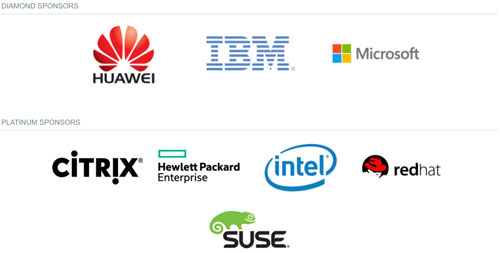Microsoft Embraces LinuxCon
The détente between Microsoft and the open source community seemed to reach a new level this week at LinuxCon North America in Toronto.
The list of the show's sponsors itself (see below) seemed an inversion of the old order, with Microsoft in the top Diamond tier while more traditional Linux heavyweights Red Hat and SUSE occupied the next tier down.

The speaker list was thick with Microsoft executives. Wim Coekaerts, Microsoft's new corporate vice president of Enterprise Open Source, gave a major keynote about Microsoft's evolving approach to Linux and open source. Technical Fellow Jeffrey Snover talked about PowerShell, which Microsoft last week released in an open source version and became available for Linux and Mac. Rob Dolin, whose titles include "Technical Diplomat" for Microsoft, took the stage with an IBM colleague to discuss an Open Container Initiative (OCI) certification program. Ross Gardler, who works on the Azure Container Service in Microsoft's Linux Compute Team, held a session on the next generation of containers. The list of Microsoft speakers goes on.
 A graphic from Jeffrey Snover's LinuxCon presentation offers a "PowerShell loves Linux" twist on the "Microsoft loves Linux" graphics Microsoft has displayed recently.
A graphic from Jeffrey Snover's LinuxCon presentation offers a "PowerShell loves Linux" twist on the "Microsoft loves Linux" graphics Microsoft has displayed recently.
The ultimate symbol at this show was a brief embrace between Coekaerts and Red Hat President and CEO Jim Whitehurst as the two passed each other on stage in the interval between their back-to-back keynotes.
"It was cool to be with Jim Whitehurst on stage. Microsoft and Red Hat together; that's a big difference from many years ago," said Coekaerts, who came to Microsoft after a long stint running open source engineering at Oracle, later in his keynote.
The "many years" portion of that quote is critical, as Microsoft has been generating "turning the industry on its head" reactions for some time now.
Coekaerts put up a slide during his keynote showing the journey. Highlights included:
- July 2009: Contributed 20,000 lines of code to Linux kernel
- April 2013: Launched Azure Virtual Machines running Ubuntu on Day 1
- October 2014: Announced that Docker would be fully supported in Windows Server
- November 2014: Announced .NET for Linux
- April 2015: Unveiled Visual Studio for Linux and OS X
- May 2015: Introduced PowerShell DSC for Linux at Ignite Conference
- September 2015: Launched HDInsight on Ubuntu at AzureCon
- November 2015: Announced Red Hat and Microsoft partnership
- March 2016: Announced SQL Server on Linux at Data Driven
- August 2016: Announced PowerShell for Linux
As Coekaerts' list shows, Microsoft's embrace of open source isn't new, but has certainly grown tighter since late 2014. Some skeptics remain concerned about whether this embrace represents a genuinely new attitude or a variation on the old embrace, extend and extinguish.
Coekaerts is busy making the case for his new employer. "Over the past few months I've been asked more times than I can count, 'Wim, why did you join Microsoft?'" he wrote in a blog post timed to LinuxCon this week. "As a Linux guy who has watched the company from afar, I am the first to admit that Microsoft hasn't always been the most open company. After talking to some of the executives at the company, I found that the days of a closed Microsoft are over."
RCP will be doing a deeper dive on open source and the Microsoft partner community in the next print issue. Drop me a line at [email protected] and let me know how the mixture of Microsoft and open source is playing out in your business.
Posted by Scott Bekker on August 24, 2016